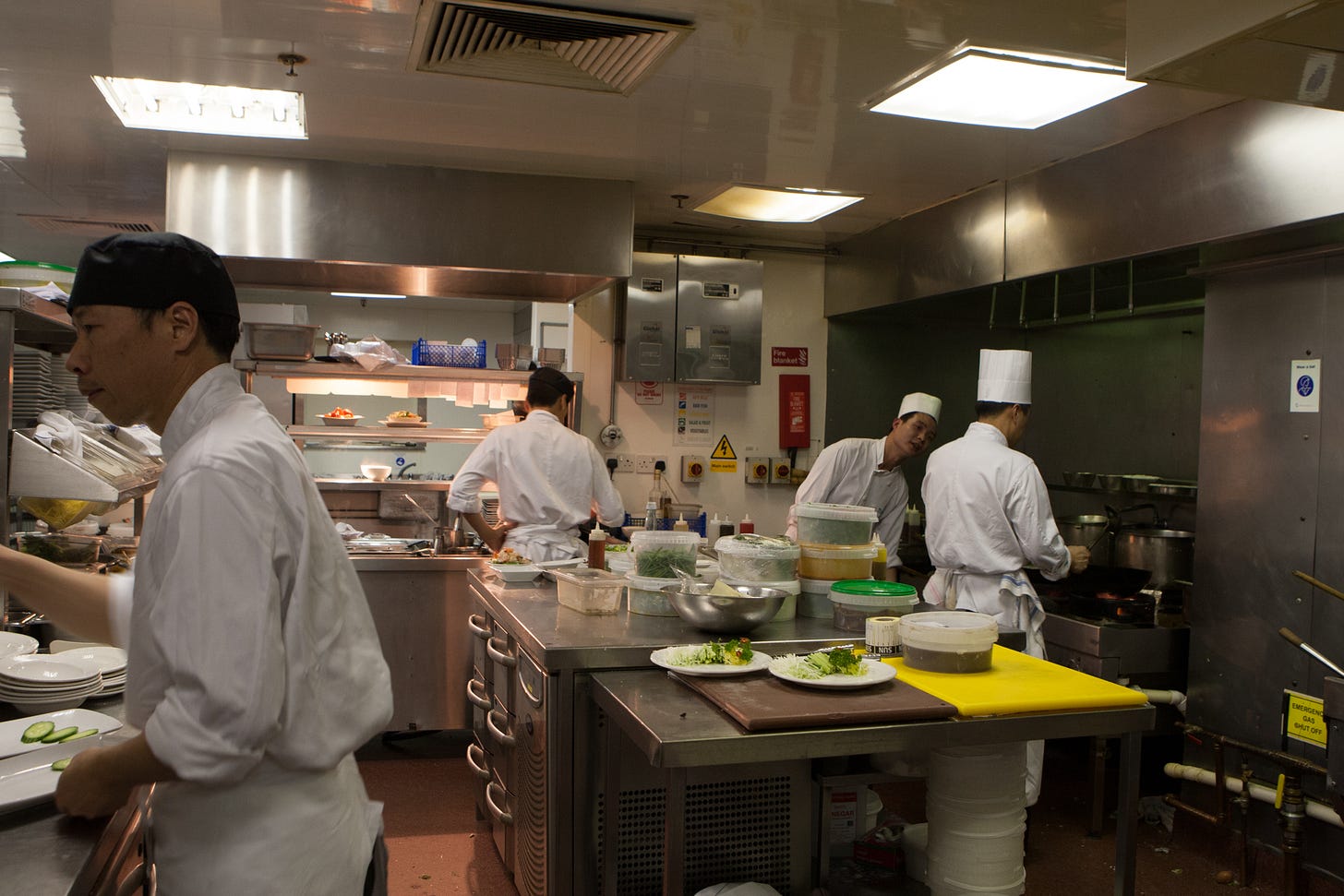Welcome to Issue #026 of The Forcing Function - your guide to delivering the right outcomes for your projects and your users.
✍️ Insights: Take the initiative to learn and to do the right thing.
🤔 Made me think: Don’t wait for others to give you permission to learn.
👨💻 Worth checking out: The joys of being an absolute beginner - for life.
✍️ Insights
Take the initiative to learn and to do the right thing.
On the inside, my brain was screaming: we shouldn’t be here, we don't have permission, we’re literally trespassing.
On the outside, I do my best to look nonchalant even though I still shift nervously on my feet.
And this isn’t the first time I’d been in this situation. I’d been in it so many times I’d got to the point where I’d give almost anything for the ground to swallow me up right now.
Each second we’re there ticks by agonisingly slowly. I wait for the inevitable moment where we get thrown out.
When it does, my Dad defuses the situation. He smiles and, in his very broken English, apologises whilst he explains he was simply curious.

We’re standing in the kitchen of yet another restaurant. My Dad is checking out what the layout of the stations and fridges and sinks are, where each person is working, and how does the food flow from order to the pass. Back then, open kitchens were not a thing so he couldn’t just look in, he had to go in.
That meant my brother or I had to accompany him. At the time, we thought that it was because he needed us around to help with translation. Looking back, he was also subtly showing us the importance of lifelong learning.
My Dad only received a limited education. However, he knew that he had to learn about the restaurant business as quickly as possible if he was ever going to open his own restaurant. A lot of that came from actually working in the environment where he started washing dishes, slowly working his way up.
But, he also knew that to learn the next level meant that you not only had to seize any opportunity to learn but also to make them as well.
Even if that meant wandering around a stranger's kitchen without permission, so that he could learn from what they had done to apply to his own restaurant. It didn’t matter to him if that meant we were thrown out more times than we were invited to stay. And regardless how it made my brother and I cringe each time he did this.
He went on to open 3 restaurants in London’s Chinatown and the running joke was he had more branches in that neighbourhood than McDonalds - they only had two.
The customer isn’t always right nor are they always wrong
A mantra in hospitality is that the “customer is always right” but if you followed that as a business analyst (BA) you’d be doing your customer a serious disservice.
From my time as the lead BA on multiple projects, I’ve have to tread the tightrope between:
Showing proper respect to my customer, staying aligned with them, and retaining their trust.
Challenging my customer to pierce through the veil of what they think that they want so that I can reveal to them what they truly need.
On one side is my expertise, for which my customer hired me. On the other side are my customer’s stakeholders. Each with their own beliefs, agendas, and views for what this project should deliver and how it should do it - which can vary wildly.
In the balance: when to ask for permission and when to ask for forgiveness.
The way I like to think about this is that it depends on my previous choice:
Am I going with the flow because the customer is right?
Am I taking a stand because the customer is wrong?
If I went with the flow all the time, I’d risk being railroaded by my customer. Any opportunities to do what’s actually needed or to direct away from mistakes would be missed. My expertise would be reduced to being a Lazy Susan - mindlessly serving whatever they wanted.
However, always taking a stand with my customer risks confrontation and being perceived as belligerent, argumentative, or worse. All of which would strain our working relationship and would erode trust. But my biggest danger would be losing all credibility by falling foul of the “The Boy Who Cried Wolf” fable.
So, like most things in life, it’s finding the right tension between these two extremes that works for you, your customer, and your project.
On one project co-owned by two different companies (Alpha and Bravo), who each thought they were the superior, keeping both sets of stakeholders aligned was doubly difficult. Whilst I was officially contracted with Alpha, I still needed engagement from Bravo. So, without asking for permission, I started regularly going to Bravo’s offices for meetings and workshops.
Whilst Alpha saw it as a sign of inferiority to go to Bravo’s office, I viewed going there as a sign of respect to get them fully engaged. Now, I could’ve asked for permission from Alpha but there would’ve been a political bun-fight about if I could, if I should, and whatever else they wanted to argue over. Who has time for that - not the project and certainly not me.
If I was questioned about it, I would’ve fought that battle as it would’ve be unprofessional of me not to address this critical component of the project.
There were a few raised eyebrows but no direct objections. It helped that it was only me going, not any of Alpha’s employees, and I made sure that the early benefits were visible as soon as possible. By taking the initiative, I improved engagement and cooperation between Alpha and Bravo and de-risked the project.
You can’t win every battle but you can’t lose them all either
Over the years, I’ve had it drilled into me that it’s the project delivery that counts at the end - not all the drama, frustrations, and tantrums along the way.
No matter how right you might be and how certain you will be telling your customer (in your head) “I told you so”, you won’t always convince, cajole, or charm them to follow your advice. That’s fine, that’s life, and they are the customer after all. The key thing is that you’ve made them aware and they’ve made a conscious choice.
That’s far better than allowing fear to hold you back from doing the right thing. Fear from nodding your head like a lemming and going with the flow when you shouldn’t be. Or, fear from the consequences of challenging your customer let alone from fighting the battle with them.
For me, I’d rather be damned for giving my professional opinion than be damned for not giving them my expertise.
I won’t always push it all the way all the time as it’s important to pick the battles to fight. Not every disagreement needs to become a battle and not every battle needs to be fought. Retreating allows you fight another day for when it really matters.
You do have more autonomy than you think. You don’t always need to wait for permission to learn (like my Dad) or to do what’s right for the project. You can choose to go with the flow or to make a stand but don’t make it your last stand.
🤔 Made me think
Don’t wait for others to give you permission to learn.
One of the reasons why I switched from permanent work to contracting is that I realised how absurd it was to leave my professional development to the whims of my line manager and the availability (or lack thereof) of the training budget.
By not having to ask permission if I could do a particular certification, I was freed from having to justify the time and the cost. I wasn’t chained to the pace set by someone else. I could choose to complete all the modules in months rather than in years.
So, here’s a question for you: are you in charge of your own career development or is it time for you to take back control before it’s too late?
🧑💻Worth checking out
🔗 The joys of being an absolute beginner - for life.

Being seen as a beginner has a bad rap.
Like puberty, it’s something to get through as quickly as possible so that you aren’t foolish, or painfully naive, or even worse - are pitied.
However, by embracing being a beginner and retaining that beginner’s mindset, you can keep growing. You can avoid the safety of being in a rut. You can become more confident in tackling the unknown.
But only if you give yourself permission to do so and ignore what everyone else thinks.
You can read the full article on The Guardian. Or I recommend checking out Below The Surface’s Dive 10 for Alvin’s take on this subject.
🖖Until next Thursday ...
If you enjoyed this newsletter, let me know with the ♥️ button or add your thoughts and questions in the comments. I read every message.
And, if your friends or colleagues might like this newsletter, do consider forwarding it to them.
For now, thank you so much for reading this week's issue of The Forcing Function and I hope that you have a great day.
PS: Thanks to P for reading drafts for me.






Thanks for the shout-out, Sam!
The story about your father working hard from the bottom to open THREE restaurants in a big city like London is truly inspiring.
And in your previous edition, you talked about spearheading an initiative to open up a student exchange from your university to Singapore. So, it sounds like you embody the same entrepreneurial spirit.
Out of curiosity, was your father tough on you growing up or was he more of a "laissez-faire" kind of father?